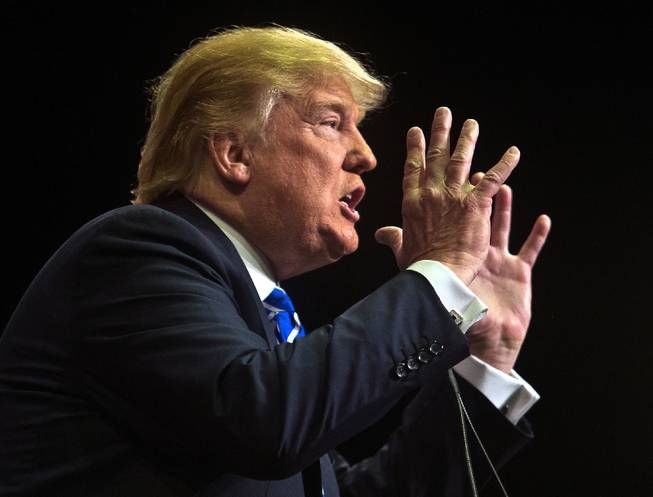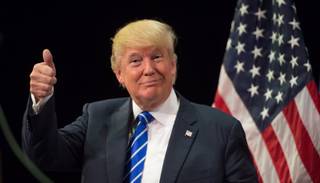
Republican presidential candidate Donald Trump delivers a speech at Mystere Theater at Treasure Island during a campaign stop in Las Vegas on Thursday, Oct. 8, 2015.
Saturday, Oct. 10, 2015 | 2 a.m.
Donald Trump, like any good reality TV protagonist, does not inspire neutral opinions. He is a savior or a disaster; a bigot or a patriot; a truth-teller or a buffoon; a commanding front-runner or a bubble on the verge of bursting. On one point, at least, there is something like political pundit consensus: that Trump’s abrasive, celebrity-driven, Don Ricklesian candidacy is unprecedented.
And it is unprecedented, if your television-watching is limited to C-Span and CNN. But if you’ve watched reality TV over the past decade or two, you’ve seen it plenty. You’ve seen it in Richard Hatch and Russell Hantz, the love-to-hate-them manipulators of “Survivor”; in the backbiting contestants in the boardroom of Trump’s “The Apprentice”; in Courtney Robertson, the feisty winner of “The Bachelor” who captured her experience in the book “I Didn’t Come Here to Make Friends,” which would make a great title for Trump’s eventual campaign memoir.
It would be reductive — and dismissive of the conservative and populist forces behind Trump’s rise — to say that his campaign simply means that politics has become reality TV. But Trump’s style does suggest that he learned at least as much about campaigning in the boardroom of “The Apprentice” as in any actual boardroom.
Traditional presidential politics is like television in Ed Sullivan’s day, when the big three networks developed the idea of “least objectionable programming” — broad, inoffensive, something-for-everyone shows, intended to keep anyone from changing the channel.
Reality TV, like Trump’s campaign, is a product of a fractious time of niche audiences. When there are hundreds of entertainment outlets, “least objectionable” is death: You need to stand out.
And he does. Like reality TV itself, Trump is a love-or-hate proposition. In a general election, true, you need much more than 23 percent of the vote (which is Trump’s number in a recent USA Today/Suffolk University poll of the Republican field). But in today’s television, a 23 share is a landslide — and in a crowded primary in an ideologically fragmented party, it is large enough for first place.
Understanding these dynamics has let Trump reverse the polarity of primary campaigning. Where traditional candidates have gaffes, he has publicity opportunities. Even his ugliest remarks — saying, after a rough debate on Fox News, that the moderator Megyn Kelly had “blood coming out of her wherever” — seemed, among his followers, to burnish his reputation as a straight shooter. It’s “The Real World” approach to politics: Let me show you, America, what happens when candidates stop being polite and start getting real!
It’s paradoxical that Trump should be the one to bring primary politics further into the niche-media era. After all, he was a boldface name when Ronald Reagan was president, and there was a time, in the 1990s and the early 2000s, when he seemed like a holdover from the Gordon Gekko ‘80s — a nostalgia piece, a Rubik’s Cube, a shoulder pad.
“The Apprentice” revived him as a celebrity, which, business success aside, is the entire point of Donald Trump. The key to Trump’s appeal as host of the show was the key to his appeal before and since: his attention to surface appearances.
Others have questioned whether Trump is actually as rich or successful as he says. (Like the debate over whether reality TV is “real,” it’s a concern for detractors, but brushed off by the fan base.) But for television purposes, he looked the part, and he did it by happily creating the most vivid pop-culture cartoon of wealth outside a Monopoly box.
From his “Art of the Deal” tabloid-era heyday to today, Trump has been a rich guy who lives like a lottery winner. His business was in casinos and hotels and golf courses, concrete things you could see and understand, as opposed to Mitt Romney’s chilly abstractions of private equity. Not for Trump the modesty of hoodie-wearing Silicon Valley: He wore suits and married models and built a 64-story tower in Las Vegas, sheathed in 24-karat gold.
He presented an idea of wealth that was brazen and crass and thus to his admirers rang open and honest, whatever legerdemain went into the actual business. This made Trump a great fit for reality TV, which treats the currency of fame the way he treats the currency of, well, currency. That is, you grow it by flaunting it. (The gilded aesthetic of his properties is more or less that of your typical dating-show mansion.)
Likewise on the campaign trail, he didn’t poor-mouth himself or claim to be just like you: He flew on his helicopter to the Iowa State Fair, like the fictional President Charles Lindbergh flying his jet over the Potomac in Philip Roth’s “The Plot Against America.”
Trump’s pugilism can be petty and indiscriminate; he began the second Republican debate by saying unprompted that Rand Paul, scarcely a threat to him, “shouldn’t even be on this stage.” But that’s reality TV combat: You fight to prove you’re a fighter. Trump knows that it is better to be the instigator than the instigated-upon: It allows you to set the rhythm, change the subject, get in people’s heads, determine the narrative.
After all, can you name a single noncelebrity contestant from “The Apprentice”? If so, it’s probably Omarosa, who didn’t win the show’s first season but, because of her clashes with fellow contestants and Trump, was its breakout star. (She also was a model for the appalling history of reality shows painting black women as belligerent villains, and she later claimed to be the victim of editing. But she was a star nonetheless.)
Trump seems to have learned from his apprentices. Facing elimination by him in the boardroom on “The Apprentice” was like being trapped in a cage with a capricious monster; you didn’t know what might anger him or why, but it was your job to make sure he ate your opponent instead of you. The situation rewarded fast talking and improvisation. And Trump’s campaign style is nothing if not improvisatory — tactical eruptions to throw rivals off-balance, to dismiss tough questions, to promise easy answers without details, to survive until the next episode.
He’s lived and campaigned by reality-show creeds: There’s no such thing as bad attention; apologies are weakness; whining is for haters and losers. And winning (Trump’s favorite gerund, like Charlie Sheen’s) is its own justification. Like the winners on “Survivor” who eventually get praised for back-stabbing their way to victory — they were just playing the game! — Trump has thus far been able to make his poll numbers the rationale for his tactics.
Of course, if his numbers start heading dramatically down, that same dynamic could set up a self-sustaining negative feedback loop, a narrative that justifies his downfall, what they call in the reality TV business “the loser edit.”
If Trump does end up fading, as some analysts are beginning to predict, you could look at “The Apprentice” for a parallel. It was, as its host would say, huge in 2004; its first finale had over 28 million viewers. Then it declined. You could blame overscheduling, poor lead-ins, a 2005 spinoff starring Martha Stewart.
But it also had a gimmick, Trump himself, that lost its novelty. In reality TV, successful formats (“Survivor,” “Dancing With the Stars”) can last a long time, but individual personalities — Paris Hilton, Simon Cowell — wear thin. Trump was not just the host but the game, and the game got old.
But if you’re looking at “The Apprentice” for signs of the future of the celebrity-political complex, it’s worth noting that the show never went away. It’s lasted 14 seasons, having switched over to a modestly rated “Celebrity Apprentice” format. And though NBC cut Trump from the show after his campaign controversies, it will return next year with another entertainer-turned-politician (turned entertainer again), Arnold Schwarzenegger.
The star may come and go. The show will go on.


Join the Discussion:
Check this out for a full explanation of our conversion to the LiveFyre commenting system and instructions on how to sign up for an account.
Full comments policy